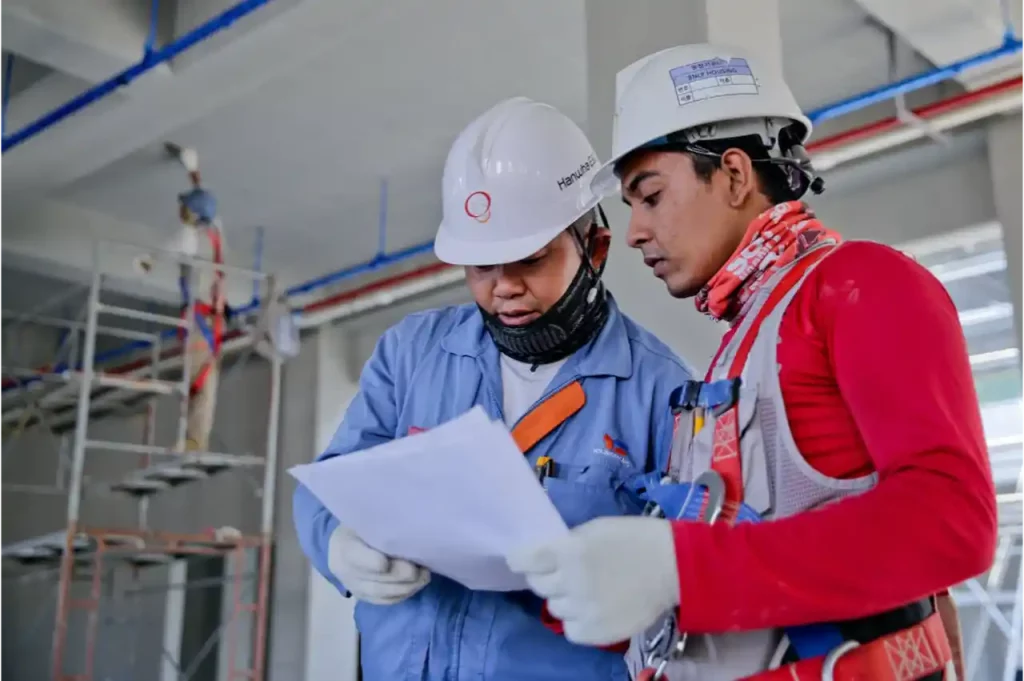Explore the clash of titans in construction – Structural Engineers vs Project Managers.
Uncover strengths, assess skills, and find out who reigns supreme!
Structural Engineers vs Project Managers – Simple Difference between In Simple Way
Certainly! Here’s a table outlining the differences between Structural Engineers and Project Managers:
| Aspect | Structural Engineers | Project Managers |
|---|---|---|
| Primary Focus | Design and analyze structural components of buildings and infrastructure. | Oversee the planning, execution, and completion of projects within constraints. |
| Scope of Work | Ensure structural integrity, stability, and safety of construction projects. | Coordinate various project elements, manage resources, and ensure project goals are met. |
| Key Responsibilities | Develop blueprints, analyze materials, and oversee construction to meet safety standards. | Plan, execute, and close projects, including budgeting, scheduling, and risk management. |
| Materials Involved | Work with materials like steel, concrete, and wood for structural components. | Focus on project documentation, schedules, and communication rather than physical materials. |
| Common Analysis Tools | Utilize structural analysis software, finite element analysis, and engineering principles. | Use project management tools for scheduling, budgeting, and collaboration. |
Watch the video if you Structural Engineers vs Project Managers want to know the difference between them.
What is the Role of a Structural Engineer?

Structural engineers are the backbone of construction projects, focusing on the technical aspects of designing safe and stable structures.
Their primary responsibility is to ensure that buildings, bridges, and other constructions can withstand various loads, including gravity, wind, earthquakes, and other environmental factors.
- Processor: 13th Generation Intel Core i9-13980HX Processor (E-cores up to 4.00 GHz P-cores up to 5.60 GHz)
- PORTABLE AND POWERFUL — Newest ThinkPad P16, more Portable than 17.3″ P17, while it has a Larger Screen than 15.6″ P15 with similar Light Weight. Certifications from Independent Software Vendors (ISVs) and MIL-STD 810G ensure your most critical applications will run reliably on this workstation laptop: AutoCAD, CREO, SolidWorks, ANSYS, MATLAB.
- Processor: 13th Generation Intel Core i9-13980HX Processor (E-cores up to 4.00 GHz P-cores up to 5.60 GHz)
- The Dell Precision 7000 stands at the peak of the Dell Precision lineup, surpassing the 3000 and 5000 series. Equipped with the latest Intel processor and the brand-new NVIDIA RTX A3000 12GB VRAM GPU, this laptop offers impressive power tailored for designers, architects, photographers, video editors, and engineers.
- Newest ThinkPad P16, more Portable than 17.3″ P17, while it has a Larger Screen than 15.6″ P15 with similar Light Weight. Certifications from Independent Software Vendors (ISVs) and MIL-STD 810G ensure your most critical applications will run reliably on this workstation laptop: AutoCAD, CREO, SolidWorks, ANSYS, MATLAB.
1. Technical Expertise and Design Precision:
At the core of a structural engineer’s role is a deep understanding of materials, physics, and structural behaviour.
They use this expertise to translate architectural concepts into detailed designs, taking into account the specific requirements and constraints of each project.
The goal is to create structures that not only meet aesthetic goals but also adhere to stringent safety and stability standards.
2. Collaboration with Architects:
Structural engineers collaborate closely with architects, turning creative visions into feasible and structurally sound designs. This partnership ensures that the final construction aligns with both aesthetic and technical considerations.
The structural engineer brings technical constraints and possibilities to the discussion, contributing to a harmonious integration of form and function.
You May Also Like: Best Laptops For Structural Engineers
What is the role of the Construction Project Manager?

A Construction Project Manager oversees all aspects of a construction project, from planning to completion. They coordinate tasks, manage budgets, liaise with stakeholders, and ensure adherence to timelines.
For example, a Project Manager might oversee the construction of a commercial building, ensuring efficient execution, cost control, and timely project delivery.
1. Project Planning and Coordination:
Project managers are responsible for developing comprehensive project plans, and considering timelines, budgets, and resource allocations. They coordinate with various stakeholders, including clients, contractors, and regulatory authorities, to ensure that the project progresses smoothly and meets all specified goals.
2. Risk Management and Problem-Solving:
Project managers excel in anticipating and mitigating risks. They are adept at problem-solving and decision-making, addressing challenges that may arise during a project. Their role is to keep the project on track, making adjustments as necessary to overcome obstacles and deliver successful outcomes.
You May Also Like: Best Laptops For Construction Managers
Collaborative Dynamics:
While structural engineers and project managers have distinct responsibilities, their collaboration is pivotal for the success of any construction project.
The synergy between technical expertise and project management finesse creates a harmonious workflow that optimizes efficiency and ensures the realization of project goals.
1. Early Collaboration for Project Success:
Effective collaboration begins early in the project lifecycle. Structural engineers and project managers work together to establish project goals, timelines, and budget constraints. This collaboration ensures that the technical requirements align with the overall project vision.
2. Technical Precision and Project Management Finesse:
The partnership between structural engineers and project managers represents a delicate balance between technical precision and project management finesse. While the structural engineer focuses on the intricacies of design and construction, the project manager ensures that these technical aspects align with broader project objectives and are executed within the constraints of time and budget.
Comparison Of Education Of Structural Engineers vs Project Managers
Understanding the educational paths and skill sets required for each role provides insights into the depth of knowledge and expertise that structural engineers and project managers bring to construction projects.
1. Structural Engineering Education:
Structural engineers typically pursue a bachelor’s degree in civil engineering with a focus on structural engineering. Additional coursework or a master’s degree may be undertaken for specialization in structural engineering. Their education emphasizes mathematics, physics, and materials science.
2. Project Management Education and Certification:
Project managers may have diverse educational backgrounds, often holding degrees in construction management, civil engineering, or business administration. Many project managers also obtain certifications in project management, such as the Project Management Professional (PMP) certification, to enhance their skills and credentials.
Decision-Making Processes Of Structural Engineers & Project Managers:
The decision-making processes of structural engineers and project managers reflect their distinct roles and responsibilities within a construction project.
1. Structural Engineering Decision-Making:
Structural engineers make decisions based on technical considerations, relying on their expertise in materials, physics, and structural analysis. Their decisions ensure that the construction meets safety and stability standards while adhering to architectural and design goals.
2. Project Management Decision-Making:
Project managers focus on decisions related to project planning, coordination, and risk management. Their decisions impact the overall progress of the project, from budget allocations to resource management, and are crucial for maintaining project timelines and ensuring successful outcomes.
Technological Advancements in Structural Engineering and Project Management:
Advancements in technology have significantly influenced the way both structural engineers and project managers approach their work, enhancing efficiency, collaboration, and project outcomes.
1. Building Information Modeling (BIM) in Structural Engineering:
BIM is a collaborative approach that allows structural engineers to create digital representations of a project, facilitating better coordination and communication among various stakeholders. BIM enhances the accuracy of design and analysis processes, improving the overall quality of construction projects.
2. Project Management Software for Efficient Coordination:
Project managers leverage advanced project management software to streamline coordination, communication, and planning. These tools help in resource allocation, progress tracking, and real-time collaboration among team members, ensuring that the project stays on course.
Career Growth and Advancement For Structural Engineers vs. Project Managers:
Both structural engineers and project managers have ample opportunities for career growth and advancement within the construction industry.
1. Structural Engineering Career Trajectory:
Structural engineers may advance in their careers by specializing in specific areas such as seismic design, forensic engineering, or project management. Leadership roles, such as becoming a chief engineer or principal, offer avenues for career growth.
2. Project Management Career Trajectory:
Project managers can climb the career ladder by taking on larger and more complex projects, earning advanced certifications, and demonstrating strong leadership and strategic planning skills. Senior project management roles and executive positions within construction firms are common career advancements.
Salary Comparison Structural Engineers & Project Managers:
The salaries of structural engineers and project managers vary based on factors such as experience, location, industry, and project scale.
1. Structural Engineer Salaries:
Structural engineers typically earn competitive salaries, with variations based on factors like experience and specialization. Entry-level positions may have lower salaries compared to those with years of experience and advanced expertise.
2. Project Manager Salaries:
Project managers often command competitive salaries, reflecting the complexity and responsibility associated with their roles. Senior project managers with extensive experience and successful project delivery may earn higher salaries, especially in large-scale construction projects.
FAQ’s
Do Project Managers Make More Money Than Engineers?
Generally, project managers may earn higher salaries than engineers due to their broader responsibilities in overseeing entire projects. However, individual earnings vary based on factors like experience and industry.
Who Is Higher: Project Manager or Engineer?
The roles of project managers and engineers are different but equally important. While project managers focus on overall project coordination, engineers, like structural engineers, specialize in technical aspects. It’s not about hierarchy; both roles are essential for project success.
Can a Structural Engineer Be a Project Manager?
Yes, a structural engineer can become a project manager. Many engineers transition into project management roles by acquiring additional skills, and experience, and sometimes pursuing certifications in project management.
Who Earns More: Construction Manager or Structural Engineer?
Salaries vary, but generally, construction managers may earn higher salaries than structural engineers. Construction managers oversee the entire construction process, while structural engineers focus on technical design aspects. Individual earnings depend on factors like experience and location.
Conclusion:
In the intricate dance of construction projects, structural engineers and project managers play indispensable roles, each contributing unique skills and expertise.
While the structural engineer ensures the technical soundness of designs, the project manager orchestrates the overall project, optimizing efficiency and ensuring successful outcomes.
Their collaboration, grounded in a mutual understanding of their distinct roles, results in the creation of safe, functional, and aesthetically pleasing structures that stand the test of time.
Whether it’s the precision of structural engineering or the finesse of project management, the synergy between these roles remains essential for the success of construction endeavours worldwide.
You May Also Like:
Structural Engineer vs Architect: Who Is Better
Structural Engineers vs Geotechnical Engineers: Who Is Better
Structural Engineer vs Architect: Who Is Better
Structural Engineers vs Surveyors: Who Is Better









